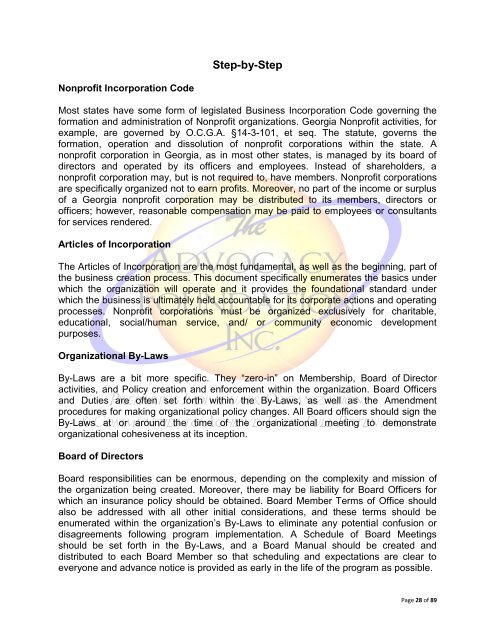The Nonprofit Incubator
The Nonprofit Incubator
The Nonprofit Incubator
You also want an ePaper? Increase the reach of your titles
YUMPU automatically turns print PDFs into web optimized ePapers that Google loves.
Step-by-Step<br />
<strong>Nonprofit</strong> Incorporation Code<br />
Most states have some form of legislated Business Incorporation Code governing the<br />
formation and administration of <strong>Nonprofit</strong> organizations. Georgia <strong>Nonprofit</strong> activities, for<br />
example, are governed by O.C.G.A. §14-3-101, et seq. <strong>The</strong> statute, governs the<br />
formation, operation and dissolution of nonprofit corporations within the state. A<br />
nonprofit corporation in Georgia, as in most other states, is managed by its board of<br />
directors and operated by its officers and employees. Instead of shareholders, a<br />
nonprofit corporation may, but is not required to, have members. <strong>Nonprofit</strong> corporations<br />
are specifically organized not to earn profits. Moreover, no part of the income or surplus<br />
of a Georgia nonprofit corporation may be distributed to its members, directors or<br />
officers; however, reasonable compensation may be paid to employees or consultants<br />
for services rendered.<br />
Articles of Incorporation<br />
<strong>The</strong> Articles of Incorporation are the most fundamental, as well as the beginning, part of<br />
the business creation process. This document specifically enumerates the basics under<br />
which the organization will operate and it provides the foundational standard under<br />
which the business is ultimately held accountable for its corporate actions and operating<br />
processes. <strong>Nonprofit</strong> corporations must be organized exclusively for charitable,<br />
educational, social/human service, and/ or community economic development<br />
purposes.<br />
Organizational By-Laws<br />
By-Laws are a bit more specific. <strong>The</strong>y “zero-in” on Membership, Board of Director<br />
activities, and Policy creation and enforcement within the organization. Board Officers<br />
and Duties are often set forth within the By-Laws, as well as the Amendment<br />
procedures for making organizational policy changes. All Board officers should sign the<br />
By-Laws at or around the time of the organizational meeting to demonstrate<br />
organizational cohesiveness at its inception.<br />
Board of Directors<br />
Board responsibilities can be enormous, depending on the complexity and mission of<br />
the organization being created. Moreover, there may be liability for Board Officers for<br />
which an insurance policy should be obtained. Board Member Terms of Office should<br />
also be addressed with all other initial considerations, and these terms should be<br />
enumerated within the organization’s By-Laws to eliminate any potential confusion or<br />
disagreements following program implementation. A Schedule of Board Meetings<br />
should be set forth in the By-Laws, and a Board Manual should be created and<br />
distributed to each Board Member so that scheduling and expectations are clear to<br />
everyone and advance notice is provided as early in the life of the program as possible.<br />
Page 28 of 89

















